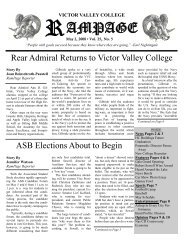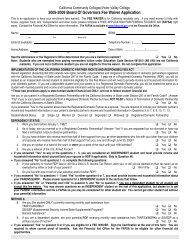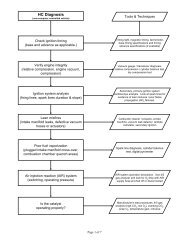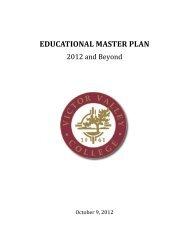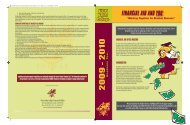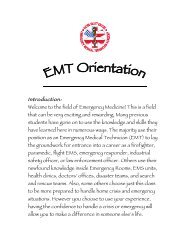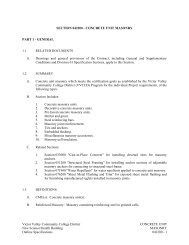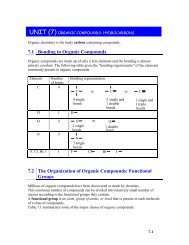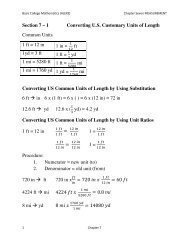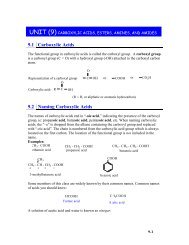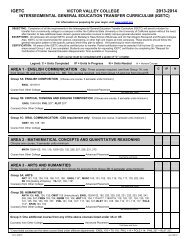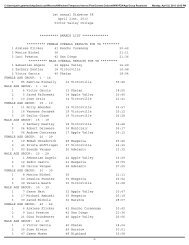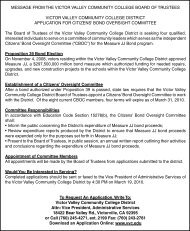Download - Victor Valley College
Download - Victor Valley College
Download - Victor Valley College
You also want an ePaper? Increase the reach of your titles
YUMPU automatically turns print PDFs into web optimized ePapers that Google loves.
PROGRAMS / COURSE DESCRIPTION<br />
Laboratory Technician<br />
Science Teacher<br />
Technical Salesperson<br />
Faculty<br />
Full Time<br />
Thomas Basiri<br />
Thomas Kennedy<br />
Degrees and Certificates Awarded<br />
Associate in Arts, Liberal Arts<br />
Associate in Science, Math/Science<br />
Associate Degree<br />
No associate degree is offered with a major in<br />
Chemistry. Chemistry courses may be used to fulfill<br />
requirements for an Associate in Science degree with a<br />
major in Math/Science. See Math/Science for degree<br />
requirements for this major. Chemistry courses may<br />
also be used to fulfill requirements for an Associate in<br />
Arts degree with a major in Liberal Arts. See Liberal Arts<br />
for degree requirements for this major. CHEM 138<br />
(Cooperative Education) may be used as Elective credit,<br />
but may not be used to fulfill major requirements.<br />
Transfer<br />
To pursue a bachelor’s degree in this field, here are<br />
some schools that have programs that might interest<br />
you. For the most up-to-date information on these<br />
programs and others, visit www.assist.org. Please stop<br />
by the Transfer Center in Building 55 or make an<br />
appointment with a counselor if you have questions.<br />
• California State University, San Bernardino<br />
Chemistry major<br />
Biochemistry major<br />
• University of California, Riverside<br />
Chemistry major<br />
Biochemistry major<br />
CHEMISTRY COURSES<br />
CHEM 50 FORENSIC CHEMISTRY<br />
Units: 5.0 - 48-54 hours lecture and 96-108 hours<br />
laboratory. (No prerequisite)<br />
This course introduces chemical and scientific<br />
techniques applicable to the analysis of physical<br />
evidence at a crime scene. Here, a crime is not limited<br />
to those against individuals. It also includes those<br />
against society such as environmental pollution, food<br />
adulteration and unsafe chemicals. The course is<br />
therefore applicable for students interested in entry level<br />
positions in a variety of fields including Administration of<br />
Justice, Anthropology and Government/Professional<br />
laboratories. A close relationship between theoretical<br />
lecture principles and field and laboratory methods is<br />
emphasized.<br />
CHEM 72 BIOMOLECULAR SCIENCE<br />
Units: 3.0 - 48-54 hours lecture. (No prerequisite.<br />
Recommended: BIOL 100 or BIOL 107)<br />
This course is a theoretical approach to laboratory<br />
techniques common to modern biotechnical/clinical<br />
laboratories. Principles of molecular biology, genetics,<br />
metabolism, and immunology will be studied with<br />
emphasis on their application to modern analytical<br />
methods. Information and Communication technology<br />
will be used to develop formal writing and public<br />
speaking skills. See cross listing for BIOL 72.<br />
CHEM 100 INTRODUCTORY CHEMISTRY<br />
Units: 4.0 - 48-54 hours lecture and 48-54 hours<br />
laboratory. CSU, UC (UC credit limitation). (No<br />
prerequisite)<br />
An introductory course in general, organic, and<br />
biological chemistry. This course is specifically designed<br />
for students preparing for careers in allied health, such<br />
as nursing and various fields of therapy. The course<br />
satisfies general education requirements for non-majors<br />
and assumes no background in chemistry. Basic math<br />
skills are highly recommended.<br />
CHEM H100 HONORS INTRODUCTORY CHEMISTRY<br />
Units: 6.0 - 48-54 hours lecture and 48-54 hours<br />
laboratory. CSU, UC (UC credit limitation). (No<br />
prerequisite)<br />
A foundation in the fundamental concepts, theories, and<br />
methodologies of Introductory Chemistry is highly<br />
recommended. Critical thinking and analytical skills will<br />
be used to develop problem-solving strategies used in<br />
Chemistry. Emphasis will be on the use of<br />
communication and information technologies in the<br />
analysis and presentation of experimental data.<br />
CHEM 114 ENVIRONMENTAL CHEMISTRY<br />
Units: 3.0 - 48-54 hours lecture. CSU, UC. (No<br />
prerequisite)<br />
A course whose concern is “Can we survive?” indicating<br />
that we live in a chemical world, a world of drugs,<br />
biocides, fertilizers, nerve gases, defoliants, detergents,<br />
plastics, and pollutants, all molecular in nature, and all<br />
produced chemically. Consideration of alternative<br />
solutions. Regulatory agencies and their functions and<br />
limitations. Introduction of sufficient fundamental<br />
chemistry to make the practical applications intelligible.<br />
CHEM 120 INTRODUCTION TO NUTRITION<br />
Units: 3.0 -48-54 hours lecture. CSU (No prerequisite)<br />
See cross listing for RMGT120.<br />
This course focuses on the fundamentals of<br />
carbohydrates, proteins, fats, vitamins, minerals, and<br />
CHEMISTRY<br />
2012-2013 <strong>Victor</strong> <strong>Valley</strong> <strong>College</strong> Catalog 157



